Chapter: 11th Political Science : Chapter 4 : Basic Concepts of Political Science Part II
Rights and Duties
RIGHTS AND DUTIES
Introduction
The language of
rights has formed part of our moral, legal and political vocabulary for many
centuries. Rights are so common in our world that we might suppose that they
are woven into a fabric of human rights. The significance of rights in the
modern era is not limited to their entrenchment in the constitutions and their
announcement in international declarations. If all human beings possess rights
merely in virtue of being human, then all humans possess rights merely in
virtue of being human, then all humans possess a certain equality of moral
standing which cuts across differences of class, caste or race or religion.
Learning Objectives
·
The meaning of
rights and its features.
·
Differences between
rights and responsibilities.
·
Different types of
rights.
·
Directive
Principles of State Policy.
·
Political
Obligations of the citizens.
·
Citizenship
·
Theoretical aspects
of Property.
Respecting Choices
In a democracy, all of the adult
citizens can vote in elections. By voting, the people make choices about how
their government works.
In an election, the majority wins and the minority loses. However the majority cannot forget the minority. The two groups must still live together. Being in the minority means you accept the choice of the majority. Being in the majority means you respect the minority. People who are in the minority must cooperate with the majority. They can try again to get what they want in the next election. For now, they must go along with what more than 50% of the voters want.
Respecting each
other will help us to live together better. People are free to tell everyone
what they think, but they should also respect the opinions of others. Each
election gives all sides the chance to say and vote for what they want.
Do you know about rights?
Rights are important conditions
of social life without which no person can generally realise his best self. It
is only when people get and enjoy rights that they can develop their
personalities and contributes their best service to the society.
They are the common claims of the
people which every cultures society recognizes as essential claims for their
development and which are therefore enforced by the state.
Isaiah Berlin defines
rights in terms of positive liberties and negative freedoms. A positive right
is an entitlement to: A right to free expression, for instance, entitles one to
voice opinions publicly. A negative right is a freedom from; Freedom of person
is a right to be free of bodily interference.
Features
v Rights
are the important rational and moral claims of the people for the societal
devel-opment.
v They are
available to all the people irrespective of caste, creed, race or gender bias.
v Rights
are duties are interrelated to each other. “No duties, no rights.” “If I have
rights it is my duty to respect the rights of others in the society”.
v Rights
are justiciable.
v Rights
are protected and enforced by the laws of the state. It is the duty of the
state to protect the rights of the people.
Let us differentiate Rights and Responsibilities
Rights and responsibilities are inseparable. When
someone is borne with a lot of responsibilities, they are automatically
bestowed upon with enough rights. Rights actually enable an individual to
perform their responsibilities in the different roles we play on a day to day
basis.
What are your responsibilities?
v To
safeguard the unity and integrity of India.
v To
protect the public property.
v To
conserve and protect the natural re-sources of the country like wildlife,
lakes, forests and rivers.
v To
maintain the spirit of brotherhood and create harmony among all irrespective of
caste, creed, colour and economic status.
v To
preserve the rich Indian culture and heritage.
v To
maintain the spirit of brotherhood and create harmony.
v To
respect the National Anthem and Na-tional Flag.
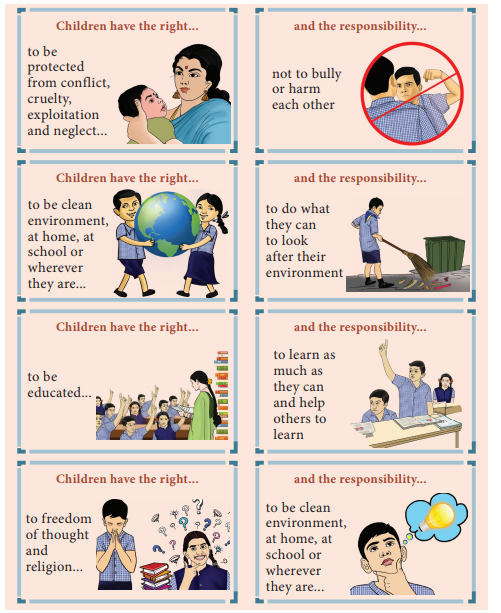
Are you aware of the different types of Rights?
i. Natural Rights
a. These rights are parts of human nature and
reason. Political theory explains that an individual has certain basic rights
and the government cannot deny these rights. In classical political philosophy,
“natural right” denotes to the objective rightness of the right things, whether
the virtue of a soul the correctness of an action, or the excellence of a
regime.
ii. Moral Rights
a. Moral rights
include rules of
good conduct, courtesy and moral behaviour. Moral Rights include rules
of good conduct, courtesy and of moral behaviour and stand for moral perfection
of the people.
iii. Legal Rights
Legal rights are equally available to all the
citizens and they follow without any discrimination. Legal rights are those
which are accepted and enforced by the state. Legal rights are of three types:
v Civil Rights: These are the rights which provide opportunity
to each person to lead a civilized social life and that which are protected by
the state. Right to life, liberty and equality are civil rights.
v Political Rights: These are the rights by virtue of which the people get a share
in the political process. These rights include the right to vote, right to get
elected, right to hold public office, etc.
v Economic Rights: These are the rights which provide the economic security to
the people. The people are empowered tomake proper use of their civil
and political rights. Right to work, right to adequate security, right to
social security.
Legal rights are what the law
says there are, insofar as the law is enforced. They gain importance through
legislation or decree by a legally authorized authority.
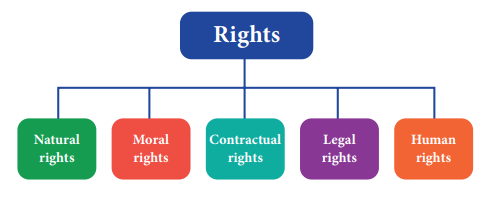
iv. Contractual Rights
These rights originate from the
practice of promise – keeping. They apply to particular individuals to whom
contractual promises have been made. The numerous examples of contractual
rights include rights to purchase a product or service, right to sell a product
or service.
v. Human Rights
Human Rights are the rights of highest order. They
are morally important and are possessed in virtue of the universal moral status
of human beings. They are protected and supported by international and national
laws and treaties.
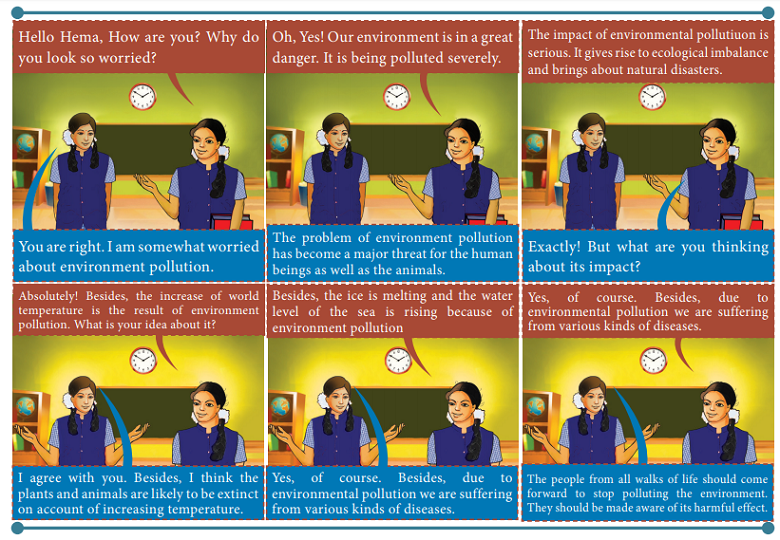
Have you heard of Bill of Rights and Fundamental Rights?
The Bill of Rights, in the United States, was
adopted as a single unit on December 15, 1791, and they constitute a collection
of mutually reinforcing guarantees of individual rights and limitations on
federal and state governments.
The Bill of Rights, in the United
States, was adopted as a single unit on December 15, 1791, and they constitute
a collection of mutually reinforcing guarantees of individual rights and
limitations on federal and state governments.
The Bill of Rights derives from
the Magna Carta (1215), the English Bill of Rights (1689), the colonial
struggle against king and Parliament. The United States Bill of Rights plays a
central role in American law and government, and remains a fundamental symbol
of the freedoms and culture of the nation.
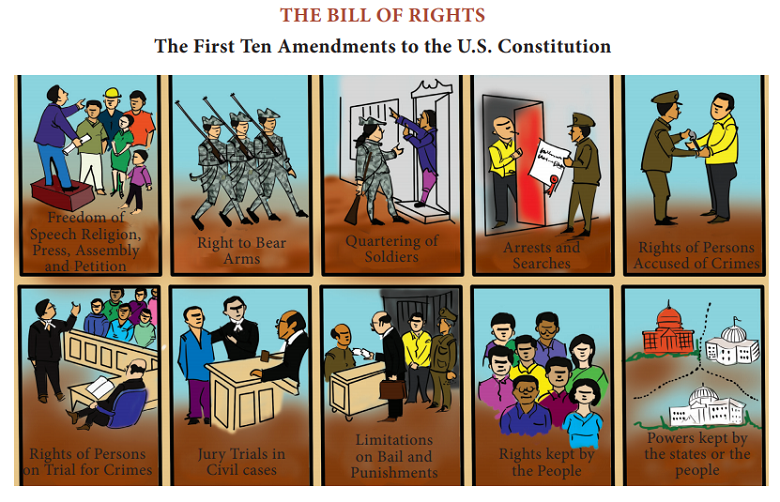
Fundamental Rights
India won independence from the
British Imperial-colonial rule in 1947.India emerged as democratic, secular
country that had high emphasis on Rights.
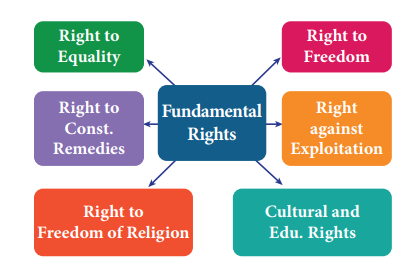
On August 29, 1947, the
Constituent Assembly set up a drafting committee under the chairmanship of Dr.
B.R. Ambedkar. The total number of amendments that were made were
approximately 7635, out of which nearly 2473 were actually moved.
The 12th session of the Assembly
held on January 24, 1950 elected Rajendra Prasad as the first President of the
Indian Union. The legal and political luminaries of the Assembly affixed their
signatures on the official copies of the Indian Constitution.
Part-III of the Indian
Constitution contains Fundamental Rights that is the critical foundation of the
Democratic ethos of the Indian Constitution. The Indian Constitution in its
text and scope is the most detailed and the most elaborate in the world. Every
minute aspect of the fundamental rights are enumerated in the Constitution
which is also one of the important aspects for it to be voluminous. The various
facets of the Fundamental Rights are elaborated below:
Right to Equality
It took
the Constituent Assembly 2 years 11 months and 20 days to frame the
Constitution.
Right to Equality guarantees
equality before law to all the people irrespective of their caste, creed,
gender and race, etc. It also emphasis on the prevention of discrimination to
visit any public places. This permits anyone to visit temples, restaurants,
hotels and places of public entertainment. It also guarantees equality of
opportunity to employment to citizens in Union or states. Right to equality forbids
any form of untouchability and considers this as a serious offence.
Right to Freedom
Equality and freedom or liberties
are the two kinds of rights necessary for democracy. This article assures
freedom of speech and expression, freedom to assemble peacefully and without
arms, freedom to form associations and to move freely throughout India. Do you
know that this Article also provides you the freedom to practise any profession
of your choice? Yes, you can. You can set up a clinic, a pharmacy or even a supermarket.
“Duties and rights are
inseparable, for the previlege of the later one has to perform the former”.-Mahatma
Gandhi
Right to Life and Personal Liberty
No citizen can be denied of his personal liberty.
This means no person can be detained without informing the grounds of his
arrest. An arrested person has also the liberty to consult and be defended by a
lawyer of his choice. Besides this, he is not to be kept under custody beyond
24 hours and must be produced before the Magistrate.
Preventive Detention
Preventive Detention is
considered as a check on the actions of the miscreants which is actually the
dire need of the hour. If the State feels that a person can be a threat to law
and order as well as to peace and security of the nation, it can arrest or
detain that person.
Here is a story to
tell you the importance of freedom. Read and enjoy!!!
Once there lived a beautiful
princess. She was very fond of birds, every morning a little bird used to come
to her palace and sing for her. The princess was very happy to see the lovely
bird and listen to its music. The bird visited the palace daily and the
princess waited eagerly for its visit every day. She was almost in love with
the bird and would keep company with her all the day. One day he princess put the
bird in a golden cage and served it the best type of food and the bird felt
sad. It neither sang or ate anything. In spite of the best food, the bird began
to grow weaker day by day and did not sing. One day the princess asked the bird
the reason and the bird said, “I want to be set free”. The kind princess set
the bird free and the bird flew happily to its freedom. The next day morning
the bird was back again with its usual song.
This story tells us that even birds
do not want to live in captivity, however well they are fed. Even your pet dog
or cat does not like to remain in the clutches of the chain. Man is born free.
He loves to lead a free and independent life.
This is the reason
why our freedom fighters fought bravely and suffered for the sake of freedom.
They preferred death rather than being a slave. This is the importance they
gave to freedom and liberty.
Right against Exploitation
There are millions and millions
in our country who are exploited and used. They are the underprivileged and the
deprived, in the society. In the today’s scenario, human trafficking has become
a serious exploitation of human beings. Human trafficking is buying and selling
of human beings and treating them as slaves. Apart from human trafficking,
child labour is another problem being faced where children are put into forced
labour without payment.
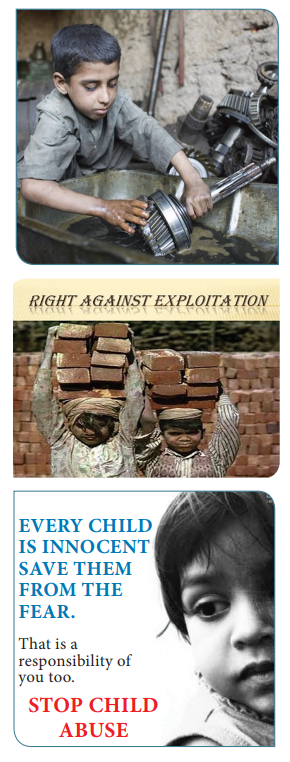
This is the reason why the Constitution has
provided with the Right against exploitation, wherein trafficking in human
beings and beggary are forms of forced labour. It also prohibits the children
below the age of 14 years from employment in any factory or mine or any kind of
hazardous labour.
Right to Freedom of Religion
In India, all the people have the right to choose
their own religion and faith. None can stop them from practising their religion
as well as propagating it. These rights include the social as well as the
personal aspects of the religion which are enjoyed by every citizen in the
country.
Right to freedom of religion guarantees to all
persons freedom of conscience and authorises them to profess, practice and
propagate any religion subject to the prescribed limitations of public order,
morality and health. Article 26 allows establishing and maintaining
institutions related to religious affairs and charitable purposes also. You can
own a movable or an immovable property and administer the property in
accordance with law.
Cultural and Educational Rights
There are certain non-political
rights of religious, cultural and linguistic minorities, groups or sections of
people. Constitution guarantees these rights for them.
No citizen is denied the admission to the State or
the State aided educational institutions owing to caste, creed, gender, etc.
The citizens have their right to get educated in any schools or colleges of
their choice. If in case the institutions are found to practise discrimination,
the government will not extend aid to such institutions. Moreover, the State
should not dictate the pattern of education to these institutions too and must
allow them to decide in order to preserve our culture.
![]()
Right to Constitutional Remedies
Constitutional Remedies provides the rights to the
citizens to move the Supreme Court or the High Court to protect their rights.
Article 32 provides the remedies to the citizens at the Supreme Court while
Article 226 by the High Court. The courts can issue writs or orders in the
nature of Habeas Corpus, Mandamus, Certiorari, Quo Warranto and Prohibition or
Injunction.
Therefore, fundamental rights are critical and
instrumental in protecting the rights and liberties of the individuals in the
country.By doing so, they establish the democratic way of living through these
cardinal principles of equality and justice.
Fundamental Rights therefore constitute the cornerstone
of our national liberty, which are cherished and attained after trials and
tribulations.
Be aware of the new rights !!!
Right to Information
Do you have any queries to the Government? You can
very well ask them about how they work and who are the members who aid in their
working. Wondering how? Yes, Right to Information Act of 2005 provides you this
with this mandate of posing queries to the working of the Government. This is
to empower the citizens and initiate transparency and accountability. An
informed citizen is kept more vigil on the instruments governing the functions
of the government thereby making them accountable.
Right to Privacy
People of India will surely not surrender the most
precious aspects of human persona, like, life, liberty and freedom. The citizen
will surely not surrender all these rights to th emercy of the state. Right to
privacy is moreover an integral part of human dignity. “The right to privacy is
protected as an intrinsic part of the right to life and personal liberty under
Article 21 and as a part of the freedoms guaranteed by Part III of the
Constitution”
Rights of Transgenders
Who are transgenders? Have you
seen them? Yes, transgender people are individuals of any age or sex and their
appearance and characteristics are different from how men and women are
supposed to be. They exist in every culture, race and class, ages back. Today
they are addressed as the third gender. The Supreme Court has infact directed
the Union and the State Governments to grant legal recognition of their gender
identity. Moreover, the fundamental rights must be available. They are also
entitled with the provision of public health and sanitation and socio-economic
rights.
Directive Principles of State Policy
Part-IV of the Indian Constitution is Directive
Principles of State Policy. It constitutes the most comprehensive political,
economic and social programme for the welfare state. They have set up the
blueprint for a humanitarian socialistic perspective. The Directive Principles
are a set of rules enforced upon the State to direct policies towards securing
adequate means of livelihood for men and women equally. It also enforces equal
pay for equal work for both men and women. These principles ensures a decent
standard of living and full enjoyment of leisure and social and cultural
opportunities.
The incorporation of Gandhian Principles under the
Directive Principles of State Policy directs in promoting cottage industries on
an individual or cooperative basis in the rural areas. These principles also
endeavour in controlling the consumption of intoxicants
Liberal Democratic Principles of
the Directive Principles helps in securing a uniform civil code throughout the
country. It also seeks to provide free and compulsory education to all children
between the age group of 6 and 14 years. It also ensures that no child is
subjected to any physical punishment or mental harassment.
Fundamental Rights
Articles 14–18 : Right to Equality
Articles 19-22 : Right to Freedom
Articles 23–24 : Right against Exploitation
Articles 25–28 : Right to Freedom of Religion
Articles 29–30 : Cultural and Educational Rights
Article 32 : Right to Constitutional Remedies
Related Topics